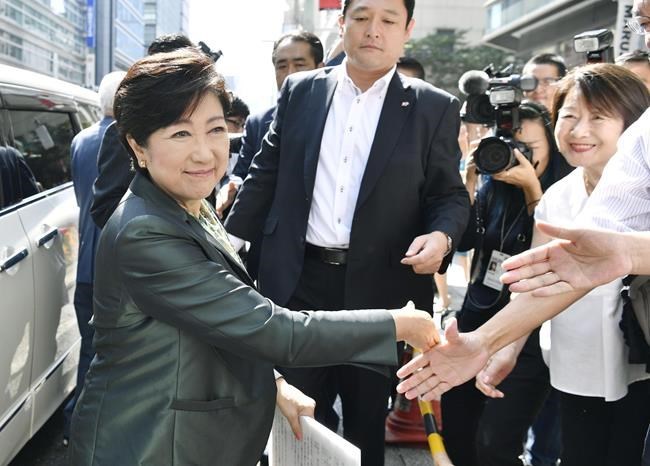
Tokyo Gov. Yuriko Koike, left, leader of Party of Hope, shakes hands with people during an election campaign in Tokyo, Tuesday, Oct. 10, 2017. Hundreds of candidates have taken to the streets as a 12-day official campaigning for Japan’s Oct. 22 lower house election kicked off, with Prime Minister Abe’s ruling party facing challenges from regrouped opposition forces. (Muneyuki Tomari/Kyodo News via AP)
Republished October 10, 2017 - 5:43 AM
Original Publication Date October 09, 2017 - 9:41 PM
TOKYO - Hundreds of candidates took to the streets Tuesday as the official 12-day campaigning period for Japan's Oct. 22 lower house election kicked off, with Prime Minister Shinzo Abe's ruling party facing challenges from regrouped opposition forces.
Up for grabs are 465 seats in the more powerful of Japan's two-chamber parliament.
Abe pledged his party's stable leadership as he sought voters' support, promising a tougher stance on North Korea, as well as social security reform to relieve burdens on younger generations in Japan's rapidly aging society.
"We should stay unwavering," Abe said. "It is the policies, rather than a boom or slogans, that can open the future."
As he did ahead of previous elections since taking office in late 2012, Abe travelled to Fukushima to appeal to voters affected by the nuclear disaster following the 2011 earthquake and tsunami in northern Japan.
Experts say Abe timed his call for an election to solidify his grip within the party at a time when opposition parties were unprepared. Support ratings for Abe's scandal-tainted government started to pick up while parliament was in recess during the summer. The ruling bloc held a two-thirds majority in the house, meaning winning a simple majority is an easy target for Abe. This would increase his chances for three more years of leadership when his party presidency expires next year.
While Abe's Liberal Democratic Party and its coalition partner, Komei, are expected to win a majority, a surging new conservative group, the Party of Hope, led by Tokyo Gov. Yuriko Koike, and a liberal-leaning constitutional Democratic Party are likely to take some seats away.
The two new groups were created in the process of breaking up what used to be the main opposition Democratic Party.
Abe is expected to stay away from his long-cherished but divisive goal of revising Japan's pacifist constitution until after the election. A revision depends on how much support he can get from conservatives outside of his ruling party.
Despite earlier anticipation of her candidacy, Koike chose not to run, apparently after seeing her party's initial popularity level off. Koike's policies are increasingly seen as conservative and moving closer to Abe's ruling party.
constitutional Democratic Party leader Yukio Edano said Abe's nearly five years of pro-business policies have escalated Japan's social divide.
"We must regain decent lives," Edano said. "We are going to change politics into one that is based on the people's voices, not one that comes down from up above."
Koichi Nakano, an international politics professor at Sophia University in Tokyo, says the election could be a transition to a less stable political environment as party alliances and regroupings may continue after the election.
A favourable result for Koike's party and its possible alliance with Abe's ruling party would mean a dominance of ultra-conservatives. In that case, Nakano said, "Japan wouldn't have a viable party system with any significant competition to speak of."
___
Follow Mari Yamaguchi on Twitter at twitter.com/mariyamaguchi
Find her work at https://www.apnews.com/search/mari%20yamaguchi
News from © The Associated Press, 2017